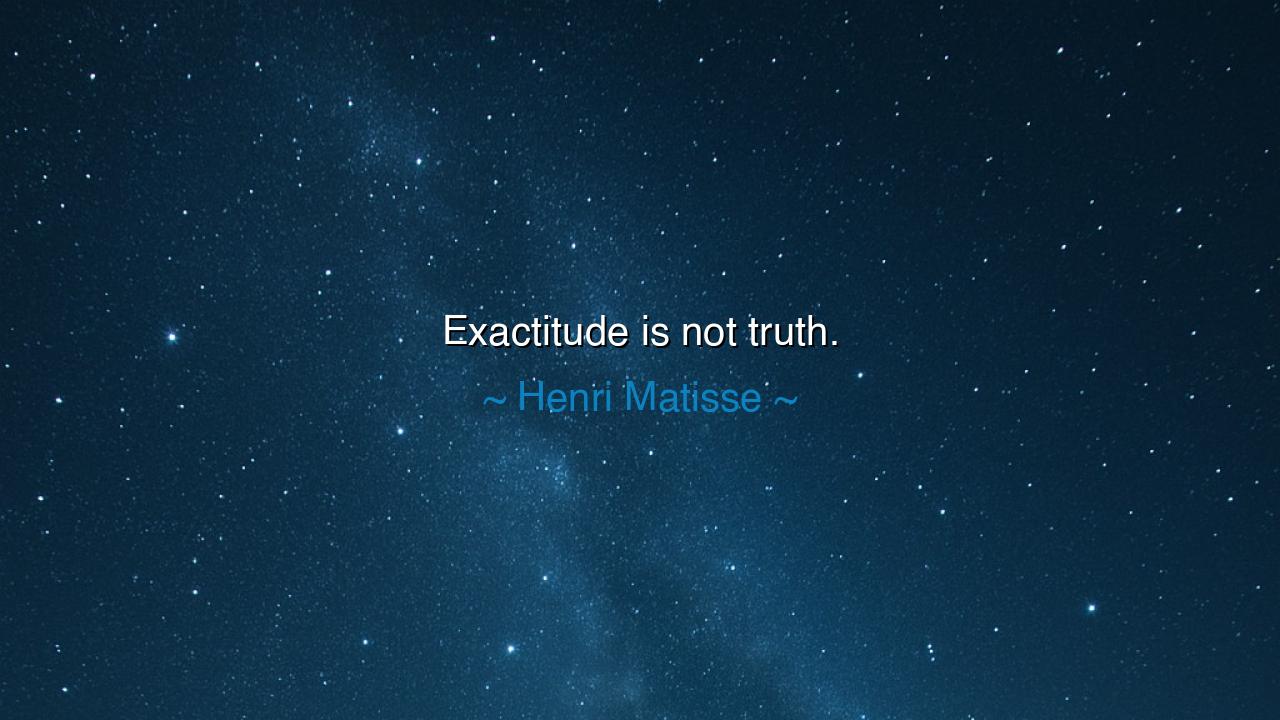
Exactitude is not truth.






Hear the words of Henri Matisse, the painter of bold colors and living forms: “Exactitude is not truth.” This is no small saying, but a torch passed down from one who gazed upon the world with both artist’s eye and philosopher’s heart. To the untrained ear, it may sound like a denial of precision, but to the wise, it is a call to look deeper. For numbers, measures, and exactitude can describe the shape of the body, yet they may fail to capture the breath of the soul.
The ancients knew that the line of a circle drawn by compass is perfect, but no living thing is found within it. Life dwells in curves, in irregularities, in the trembling of the hand that dares to paint what it feels rather than what it calculates. Thus, truth cannot be bound entirely by exactitude, for the living world exceeds the measure of any rule or instrument. The heart sees what the eye alone cannot. The spirit knows what the ledger cannot write.
Consider the tale of the great navigator Christopher Columbus. His maps, his calculations, his exactitude in reckoning the seas were flawed. By measure and reason, he was wrong. Yet in his error, he discovered a new world. His voyage teaches us that the destiny of men is not always found in correctness, but in daring, vision, and faith beyond the numbers. His journey was not born from exactitude, but from an intimation of truth that beckoned from beyond the horizon.
And look also to the poet. When Homer sang of Achilles, of Hector, of Troy, he did not weigh his words on scales nor measure their syllables with perfect instruments. He gave us heroes who breathe fire and sorrow, though perhaps they never lived as sung. Yet, through the poetry, we sense the eternal struggle of man against fate, of honor against death. It may not be exact, but it is more than exactitude—it is truth. For the heart is nourished not by the catalog of battles, but by the meaning that lives within them.
Thus, let us take heed. To cling to exactitude alone is to mistake the bark for the tree, the mask for the face. A doctor may chart every number of a patient’s body—pulse, blood, temperature—and yet fail to see the despair in the patient’s eyes. An architect may measure every stone, but without vision, the house will be cold and dead. True wisdom demands both measure and spirit, both fact and meaning. Exactitude is a tool, but it is not the summit.
What then shall be our practice? Let us not despise precision—it has its noble place. But let us marry it with imagination, with compassion, with vision. When you speak, do not only recite the fact; seek also the heart of the matter. When you create, do not only strive for correctness; let your work breathe with soul. When you live, do not only count the days; fill them with meaning.
So remember this teaching: exactitude is not truth. Truth is larger, deeper, more radiant. It is the flame behind the lamp, the wind behind the sail, the spirit behind the word. Let your life be not merely correct, but true. Let your deeds carry not only precision, but purpose. And in this way, you will walk not as one bound by the narrow lines of measure, but as one who strides in the vast fields of eternal truth.






DTdieu thuong
I find Matisse’s quote both liberating and challenging. It suggests that truth isn’t confined to facts and precision, which gives room for a more nuanced understanding of the world. But how do we distinguish between when exactitude is necessary and when it hinders the deeper truth? In a world that values precision, can we allow space for subjective, emotional, or artistic truths that can't be quantified?
TUnguyen Le Thu Uyen
Matisse’s statement really shifts my perspective on the relationship between exactitude and truth. It seems to suggest that truth isn't always about being precise or technical. Could it be that some truths are about interpretation, feelings, or experiences that can’t be measured in exact terms? How do we then approach areas like science and history, where precision is valued? Maybe the balance lies in recognizing when exactness serves truth and when it limits it.
GGudBoiZZ
This quote by Matisse suggests that truth goes beyond being just 'exact' or 'accurate,' which is a thought-provoking idea. Does this mean that facts and truths are not always synonymous? In our pursuit of knowledge, could we be overly focused on getting things right at the expense of understanding the bigger, sometimes messier, picture? I wonder if truth requires a more holistic approach that allows room for ambiguity and interpretation.
MANguyen Minh Anh
Matisse’s quote makes me reflect on the idea that truth might not always align with precision. Does this mean that truth is often more emotional or experiential rather than factual? When we prioritize exactness, do we risk ignoring the subtler, more personal aspects of truth that can’t be neatly defined? It challenges the way we approach knowledge and forces me to reconsider how we value detail in our search for truth.
HHtran hoan hao
I find Matisse’s statement intriguing, especially as it challenges the idea that being exact or precise automatically leads to the truth. Can we always rely on factual accuracy to uncover deeper truths, or do we need to accept that some truths are nuanced and cannot be fully captured by numbers or details? It makes me think about how art, in particular, often expresses truth in ways that go beyond exactitude.